Can Hyperbaric Oxygen Treatment Help with Brain Injury? | Cognitive FX
Oxygen is good for the brain. A lack of oxygen is bad for the brain. So is getting more than normal levels of oxygen better for the brain?
Published peer-reviewed research shows that Cognitive FX treatment leads to meaningful symptom reduction in post-concussion symptoms for 77% of study participants. Cognitive FX is the only PCS clinic with third-party validated treatment outcomes.
READ FULL STUDY
Very few clinics offer specialized treatment for post concussion syndrome (PCS). Cognitive FX specializes exclusively in treating the root causes of lingering post-concussion symptoms (as well as those caused by similar brain injury mechanisms, such as transient ischemic attack or carbon monoxide poisoning). Amen Clinics treats a wide variety of mental health disorders, emotional issues, and behavioral challenges, such as depression, anxiety, addictions, and anger. This article examines the differences in evaluation, treatment, support, and pricing of Amen Clinics vs. Cognitive FX for persistent symptoms of brain injury.
Dr. Daniel G. Amen, the founder of Amen Clinics and author of “Change Your Brain, Change Your Life,” believes mental health disorders should be considered physical brain disorders and treated accordingly. As such, the clinics use a brain imaging technique called SPECT to measure blood flow and activity in the brain. According to Dr. Amen, they provide patients with a comprehensive, personalized treatment plan to enhance brain health. This treatment often focuses heavily on a regimen of proprietary supplements and pharmaceuticals.
At Cognitive FX, patients receive a combination of guided exercise and multidisciplinary therapy to target the functional problems stemming from brain injury (functional changes in the brain, nervous system, eyes, and inner ears). We use a more detailed brain scan (fNCI), along with other physical and cognitive evaluations, to tailor each therapy regimen to the specific brain injury sustained by each patient.
Both programs offer patients brain imaging and treatment options. But the actual patient experience couldn’t be more different.
This article is designed to help you if you are trying to decide between Amen Clinics and Cognitive FX for treatment. While we recognize we’re biased toward ourselves, we’ve done our best to factually outline key differences to consider when making your decision. We compare the following for both clinics:
Here’s a very brief overview before we get into all the details:

90% of our patients report reduced symptoms after their treatment at Cognitive FX. To see if you’re a good fit for our program, sign up for a consultation.

Both clinics have large treatment teams, but the specialties offered at the Amen Clinics and Cognitive FX are very different.
If you review Amen’s team of professionals (listed here), you can see that the vast majority of their staff are psychiatrists (some of whom specialize in certain groups of patients, such as children, adolescents, adults, and geriatric patients). Their teams also include naturopathic physicians and a few integrative and functional medicine specialists. Each Amen Clinics location (New York, Washington, Dallas, Chicago, San Francisco, and more) has a slightly different mix of professionals.
While these healthcare professionals have the background necessary to treat mental health problems, such as depression and anxiety, many of them lack the background necessary to treat the root problems behind PCS. They could treat emotional symptoms with medication, but many post-concussion patients do not respond well to medication. Even if they can treat some of the emotional symptoms (such as poor mood and stress), other concussion symptoms (think headaches, double vision, dizziness, and the like) are better treated via rehabilitation from trained therapists.
Even more fundamentally, the emotional symptoms PCS patients suffer from are not primary symptoms (in most cases). Instead, they develop due to other underlying causes and are usually considered secondary symptoms. When you treat the underlying, primary causes of those symptoms, they often clear on their own or become much easier to treat. For example, angry outbursts might stem from the brain getting functionally overwhelmed because it isn’t properly filtering sensory information. If you help the brain recover a normal ability to filter light, sound, etc., then it’s much easier not to be angry!
Also, consider the range of conditions Amen Clinics providers claim to treat. (See “conditions we treat” on their website.) Their team treats over 40 different medical conditions (mostly mental health conditions). Some of the diverse conditions they treat include attention deficit disorder (ADD), autism, anger issues, mold toxicity, and weight problems. We feel that traumatic brain injuries are a little out of place on this list compared to traditional mental disorders, like schizophrenia, panic attacks, and bipolar disorder.
It’s worth asking the question: How many of these conditions can they truly treat well when their attention is divided among so many different issues? Can they make good on their claims to give you a “better brain”?
.png?width=1608&height=663&name=amen-clinics-vs-cfx%20(7).png)
At Cognitive FX, our team includes medical specialties that are highly relevant to treating brain injury complications. Our staff includes neurosurgeons, neurologists, neuropsychologists, psychiatrists, neuroscientists, physical therapists, speech and language therapists, occupational therapists, vision specialists, athletic trainers, licensed massage therapists, and other brain injury specialists.
Our specialists work together under one roof to address the root causes of PCS. One of the main problems we see in PCS patients is neurovascular coupling dysfunction. A mild traumatic brain injury (mild TBI) affects how brain cells communicate with surrounding blood vessels to receive the resources they need. In a normal brain, this process — called neurovascular coupling (NVC) — means brain cells can “request” what they need, and blood vessels deliver to the right location at the right time. However, this mechanism can become uncoupled after a concussion. As a result, some areas in the brain are no longer able to complete their tasks efficiently, and patients can develop symptoms, such as headaches, brain fog, and fatigue. NVC dysfunction responds well to targeted therapy.
Our team members can also treat symptoms caused by dysfunction of the autonomic nervous system (ANS), also known as dysautonomia, which is common in PCS patients. ANS controls vital body functions (such as heart rate, blood pressure, and breathing rate) via two subsections called the sympathetic nervous system (SNS) and the parasympathetic nervous system (PNS). The SNS regulates the “fight or flight” response, while the PNS is responsible for the “rest and digest” process. Under normal circumstances, SNS and PNS work together, but concussions disrupt this harmony. In most cases, the SNS remains activated even when it’s not needed, causing symptoms such as fatigue, headaches, high blood pressure, heart rate changes, body temperature changes, digestive issues, problems sleeping, mood changes, and more.
Further reading: Autonomic nervous system dysfunction after a TBI
In addition, we have team members specialized in vision and vestibular symptoms, which are also common after a concussion and/or whiplash. These include, for example, blurry vision, difficulty reading, dizziness, and poor balance. Our team uses a variety of exercises tailored to each patient to address these symptoms.
Further reading
Amen Clinics
Cognitive FX
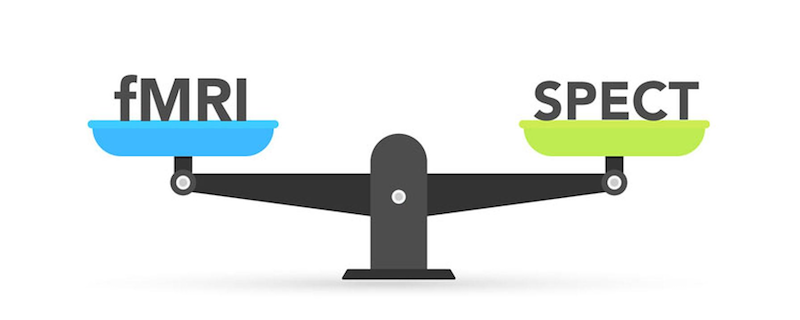 Brain imaging technology is a crucial part of assessing patients at both clinics. However, the method used is different, as is the information gleaned. Amen Clinics uses single photon emission computed tomography (SPECT), and Cognitive FX uses functional Neurocognitive Imaging (fNCI), a type of functional MRI.
Brain imaging technology is a crucial part of assessing patients at both clinics. However, the method used is different, as is the information gleaned. Amen Clinics uses single photon emission computed tomography (SPECT), and Cognitive FX uses functional Neurocognitive Imaging (fNCI), a type of functional MRI.
There are other imaging techniques available, including CT and MRI scans, but Amen Clinics acknowledge — and we agree — that these scans offer very limited information for treating concussion patients. CT and MRI scans can show structural damage to the brain, such as fractures or bleeding, but these scans cannot show how your brain is functioning. (For more information, see our post on why CT scans can’t detect concussion).
A full evaluation at the Amen Clinics includes two brain SPECT imaging studies: one done with the patient at rest and the other while the patient completes a concentration task.
Patients are injected with a radioactive isotope which travels through the patient’s bloodstream. A special camera placed above the patient can detect the radiation emitted by the isotope, and a computer then triangulates where the gamma rays are coming from. Combining all collected images creates a 3D map of blood flow activity over time in the patient’s brain. Patients are exposed to a small amount of radiation, but this exam is not associated with long-term risks as long as it is not repeated frequently.
According to Dr. Amen, brain SPECT scans are highly accurate in differentiating TBI from other disorders that have similar symptoms. For example, a study published by the research team at Amen Clinics found that SPECT imaging can separate PTSD from TBI with high accuracy. In other words, the SPECT exam is useful in establishing whether or not an injury occurred.
Unfortunately, the scans do not offer granular detail on specific brain regions and how they were affected by the injury. This makes it impossible to design a personalized treatment plan based only on the scan results.
SPECT imaging may be better than CT or MRI, but it’s still very limited. At Cognitive FX, we use a type of MRI called functional Neurocognitive Imaging (fNCI). fNCI allows our therapists to image 100 different brain regions, investigating blood flow patterns and how these regions communicate with each other while our patients complete a set of predetermined cognitive tasks. The scans paint a picture of brain function throughout key areas of the brain.
When comparing the two types of scans, fNCI has a significantly higher resolution than SPECT. fNCI can examine blood flow on a scale of a few millimeters, whereas SPECT stays within the centimeter scale. Also, it takes about 10-15 minutes for SPECT to produce an image, whereas fNCI generates second-by-second pictures of how the brain reacts to a given stimulus.
The functional brain scan produces near real-time images which are compared to a healthy control database to identify where NVC dysfunction is occurring and how it has affected different regions of the brain.
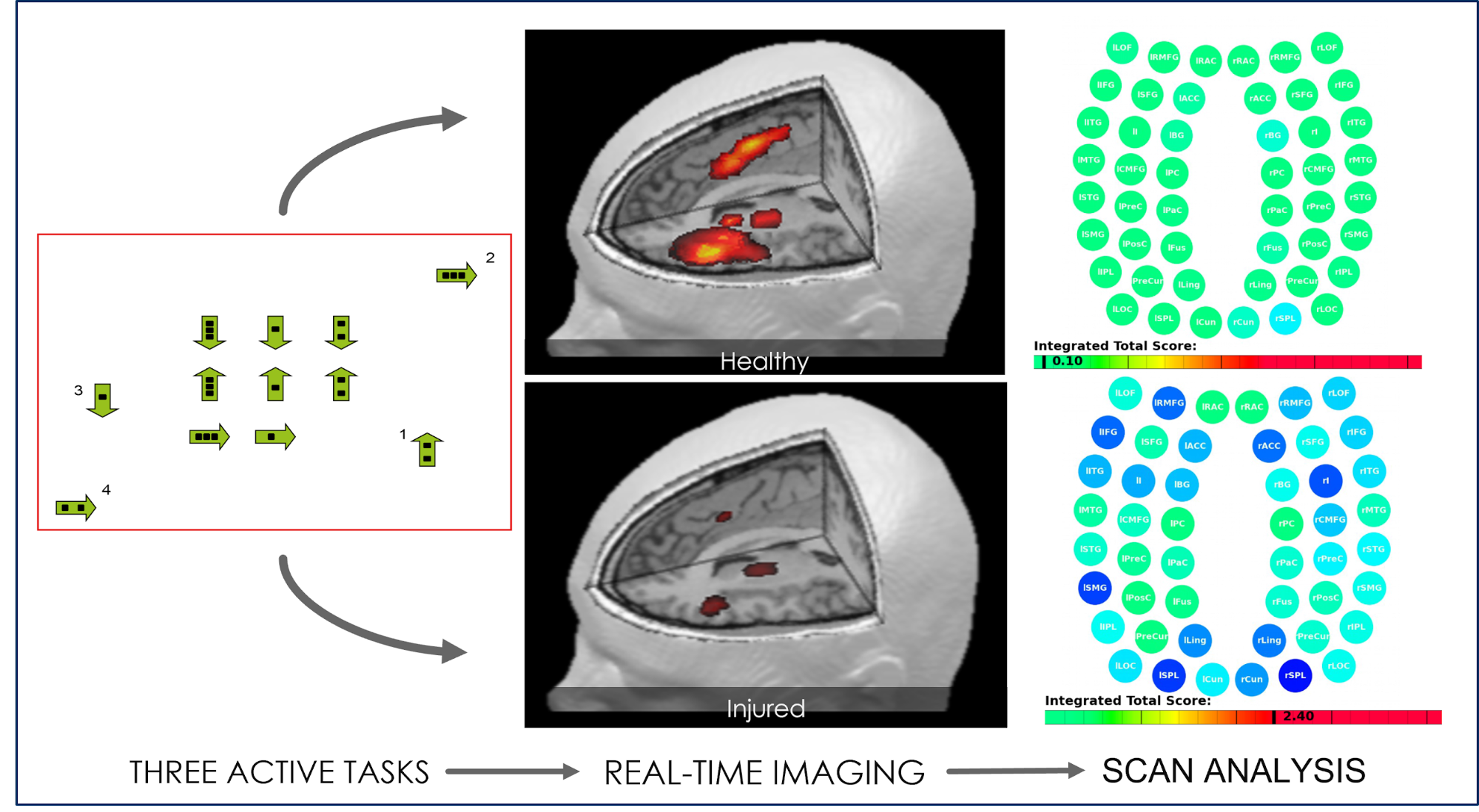
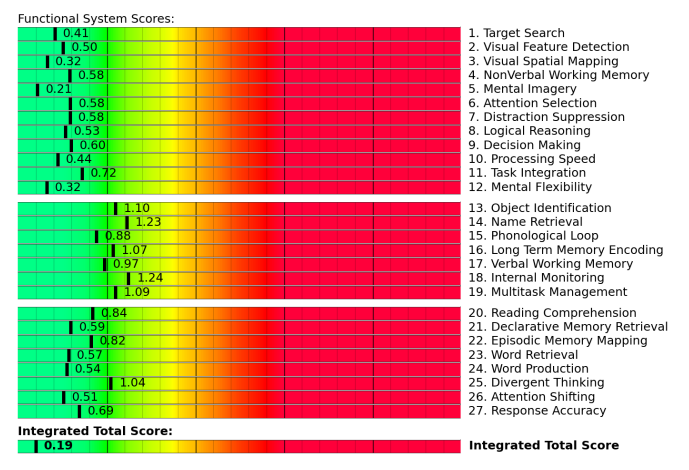
The scans are used to produce a final score for key areas of the brain. Scores in the yellow to red sections indicate neurovascular coupling dysfunction in the areas of the brain responsible for that particular cognitive function.
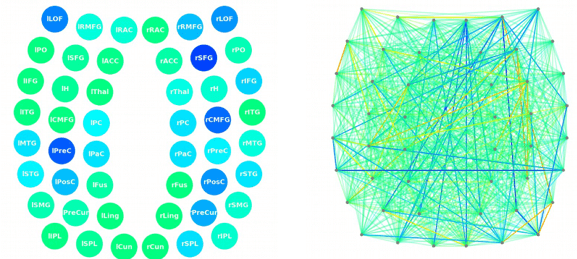
When it comes to how different areas of the brain communicate with each other, regions in green are normal, whereas areas in blue show less brain activity than expected. For example, in this scan, rACC (the right anterior cingulate cortex) shows less activity than usual. rACC is crucial in sustained attention, contributes to other forms of attention, and could contribute to memory problems if under-functioning. With this information, clinicians at Cognitive FX can prioritize sustained attention during therapy for this patient.
The wealth of information from these scans allows our team to design a personalized treatment plan to target exactly the areas each patient needs. In practical terms, our therapists can adjust their therapy exercises based on which regions of the brain are struggling and in what way.
Further reading: SPECT vs fNCI scans.
This is something the team at Amen Clinics cannot offer. When former Amen Clinics patients come to our clinic for imaging, we can see that the general patterns of their SPECT scan align well with our fNCI scans, but the SPECT scan doesn’t offer enough detail to develop a tailor-made treatment.
Amen Clinics
Cognitive FX
Note: Some patients are uncomfortable with the radiation exposure required by nuclear medicine techniques such as SPECT. fNCI does not require an IV of radioactive isotopes and is completely safe.

In addition to brain imaging, the team at Amen Clinics also looks for other factors that can contribute to symptoms. The testing protocol includes:
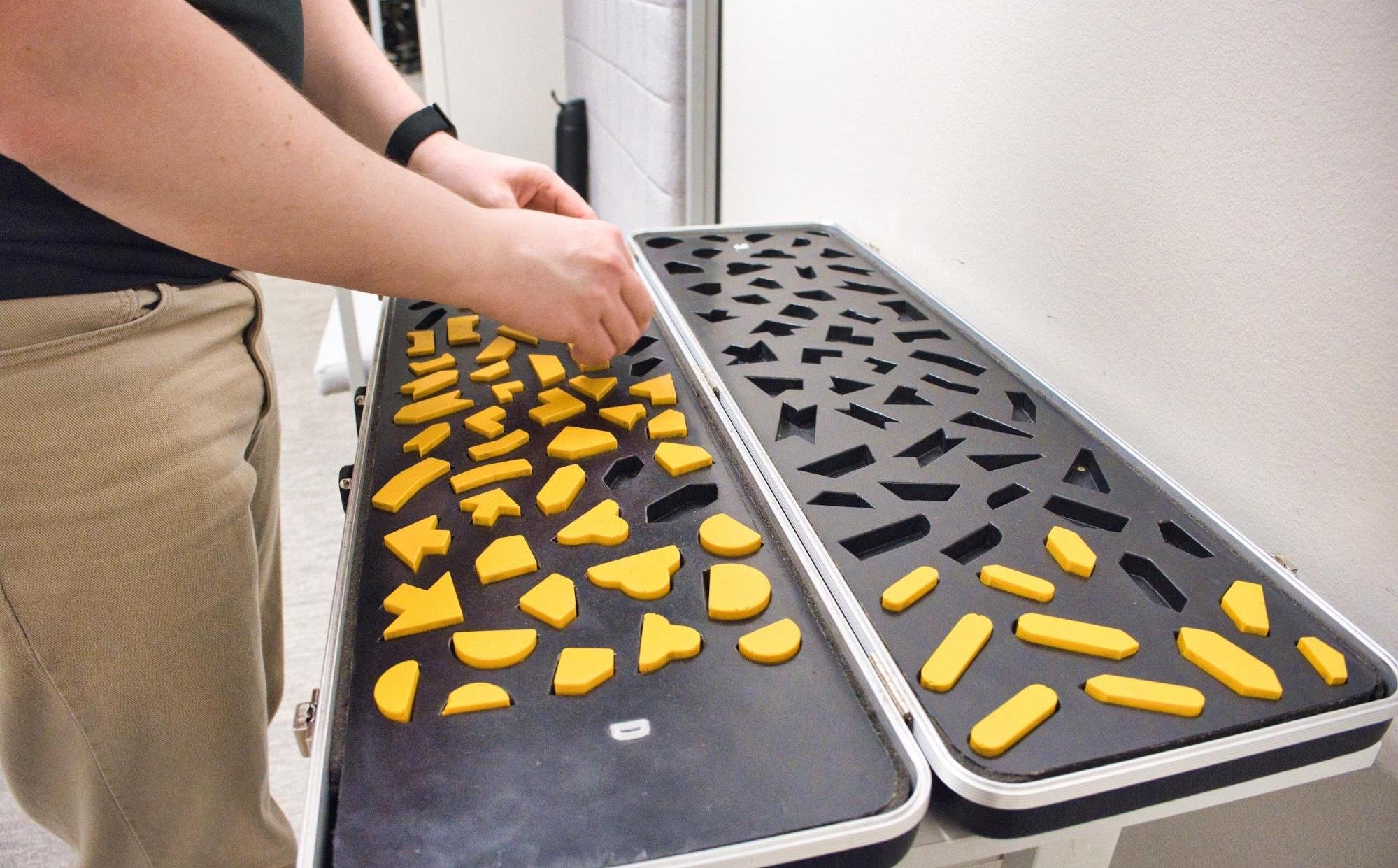
Before treatment starts, our team conducts a comprehensive evaluation, starting with the patient’s medical history and symptoms. Patients also undergo a variety of exams, including:
Therapists also look for signs of ANS dysfunction, and a neurointegration specialist evaluates how well your inner ear, eyes, and body align and communicate. Most of these tests are repeated at the end of the week to assess how much the patient has improved.
Both clinics offer additional testing to assess physical, cognitive, and psychological symptoms. The testing at Amen Clinics might include blood panels if needed. The testing at Cognitive FX is more extensive and goes deeper into issues like autonomic, vestibular, and vision dysfunction.

Using the information gathered during their psychiatric evaluation (described above), the Amen Clinics team designs a personalized treatment plan to address specific symptoms affecting each patient. Some of the treatments they advertise in their “concussion rescue” program include:
Anecdotally, most patients in reviews and in conversations with our team report having been sold some combination of nutraceuticals through Dr. Daniel Amen’s supplement company, BrainMD. There is a strong financial incentive for Amen Clinics to push patients toward supplements.
Hyperbaric Oxygen Therapy (HBOT)
Amen Clinics are not the only ones offering HBOT to treat concussions and post-concussion syndrome. Unfortunately, there’s not much evidence that HBOT helps post-concussion syndrome.
Hyperbaric oxygen therapy can be a life-saving treatment for patients with low levels of oxygen in the blood, but the evidence to support its use in PCS patients is limited. In fact, studies show that flooding the body with oxygen may be counterproductive. HBOT results in a decrease in the levels of carbon dioxide in the blood, which in turn restricts blood flow and reduces the total amount of oxygen in the brain. That said, HBOT can help repair tissue damage. It’s entirely possible that, in some cases, HBOT may be helpful after head trauma, but further research is needed to understand exactly how. Because we don’t believe the evidence supports its use, we do not offer HBOT at our clinic.
Further reading: Hyperbaric oxygen therapy for post-concussion symptoms
Neurofeedback
Similarly to HBOT, we don’t think neurofeedback is a well-founded treatment option for PCS patients.
Neurofeedback can help patients dealing with depression, anxiety, post-traumatic stress disorder (PTSD), or obsessive-compulsive disorder (OCD). Clinics that offer neurofeedback claim they can also use this approach to identify brain wave frequencies coming from areas of the brain affected by a head injury. Unfortunately, that’s just not true. We’ve dissected the scientific underpinnings of neurofeedback and what you can and can’t do with it in another post (linked below).
Further reading: The pros and cons of neurofeedback in PCS treatment
Hormone Evaluation and Replacement
If the team at Amen Clinics believes their patients are suffering from a hormone imbalance, they test hormone levels and recommend hormone therapy replacement, if needed. We offer hormone testing to certain patients but often advise patients to form a relationship with a local endocrinologist or other qualified physician to manage any hormone imbalances they experience.
Medication
At the moment, there is no medication that can treat PCS. Nevertheless, the team at Amen Clinics advertises that they use medication as needed. The list includes painkillers for headaches and migraines, sleeping pills for sleep disturbances, and antidepressants for emotional problems.
Unfortunately, meds don’t address the root cause of the symptoms, and while patients may feel better for a short period, symptoms won’t go away just with meds. Plus, the side effects can be just as bad as the actual symptoms. At Cognitive FX, we never use medication to treat PCS patients.
Further reading: Medication for post-concussion syndrome
Supplements for Post-Concussion Syndrome (Targeted Nutraceuticals)

There is some evidence that dietary supplements — such as magnesium, vitamin D, and omega 3 fatty acids, for example — can be helpful in addressing PCS symptoms.
Taking the right nutritional supplements can play an important role in healing brain damage quickly, and it’s good that patients have access to these products. However, our concerns with the supplements offered by the team at Amen Clinics are regarding price and efficacy. Most supplements that independent scientific research identifies as useful in post-concussion recovery can be sourced outside of Amen Clinics. They are relatively inexpensive products that can easily be found elsewhere once the patient has some basic education on what is and isn’t helpful.
For example, one of their products is “Calm My Brain,” a supplement advertised to diminish anxiety sold by BrainMD, Amen’s supplement business. Its active ingredients are magnesium, L-theanine, and ashwagandha. In October of 2023, a one-month supply costs $45 or $38 with a regular subscription. They claim that, “This breakthrough science-based formula provides fast-acting relief from stress and anxiousness in as little as 40 minutes!*” The asterisk is for a disclaimer that these claims haven’t been evaluated by the FDA and that the supplement is “not intended to diagnose, treat, cure, or prevent any disease,” despite the fact that Amen Clinics frequently recommends supplements as part of their treatment protocol.
Regardless, ashwagandha is associated with lowering blood pressure, which could have a negative effect on PCS patients suffering from post-concussion POTS symptoms. Some PCS patients might find it helpful, but others could find it harmful, especially if they suffer from gastrointestinal symptoms (such as a dairy allergy) or are unusually sensitive to medicinal herbs (not uncommon after a head injury). In addition, the l-theanine contained in BrainMD’s recommended dosage is above what has been studied and found safe. Meanwhile, safe and effective doses of the magnesium and l-theanine can be acquired separately for a combined total of about $20/month.
Most physicians can help ensure that you’re taking safe, appropriate levels. That makes the proprietary cocktails with larger-than-recommended doses of nutraceuticals offered at Amen Clinics unnecessary for most patients.
Also, it’s important to note that although these dietary supplements can be beneficial, they should not be seen as a complete treatment and are not enough to address the problems caused by PCS.
Nutrition Coaching
Amen Clinics offer nutrition coaching to help patients make informed decisions about their diet. Many studies show that following a healthy and balanced diet can help the healing process in the brain. This is not surprising, as PCS increases the brain's energy needs as it tries to repair itself and regain normal function.
We have a free guide to post-concussion nutrition that you can access anytime online. If you need advice on meal planning, most nutrition professionals can help once they understand your situation. Some workplace health and wellness plans even offer nutritional counseling for free; you can check with your employer to see if you are eligible.
Psychotherapy
As described earlier, most of the team at the Amen Clinics are experts in psychiatry, and psychotherapy is a vital part of the treatment offered. This can be extremely beneficial for PCS patients, as depression, anxiety, ADHD, suicidal thoughts, moodiness, and other mental health problems are common after a brain injury.
One of the most beneficial types of talk therapy for PCS patients is cognitive behavioral therapy. If this type of therapy is something you are interested in, you can learn more about it and find licensed providers in our post about cognitive behavioral therapy for post-concussion syndrome.
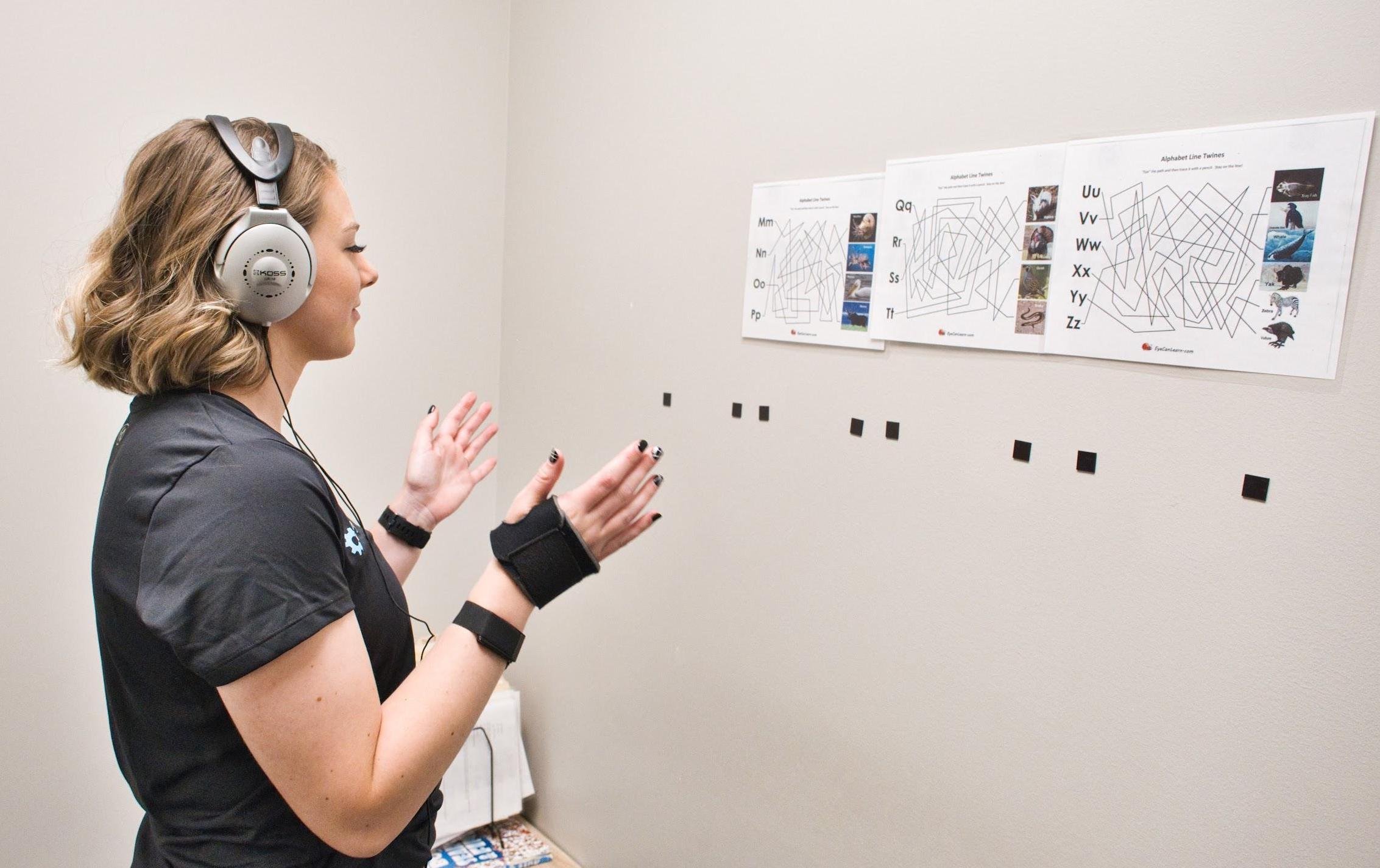
At Cognitive FX, we combine aerobic exercise and multidisciplinary therapies to target the root problems in PCS patients, including neurovascular coupling disruption, autonomic dysfunction, vision changes, and vestibular issues. We believe this is the best way to treat PCS, rather than addressing the secondary consequences — such as depression and anxiety — like Amen Clinics do.
After patients complete the evaluation process described earlier, they begin treatment. Treatment involves a three-step cycle that is repeated multiple times: Prepare, Activate, and Recover.
The prepare step starts with short intervals of intense cardiovascular exercise, usually on a stationary bike or treadmill. Exercise improves blood flow within the brain and promotes the release of a compound called brain-derived neurotrophic factor (BDNF), which helps the brain adapt to changes and boosts the impact of subsequent therapies.
Next, patients start the activate step, which involves a series of therapies to activate the brain and treat PCS symptoms, including:
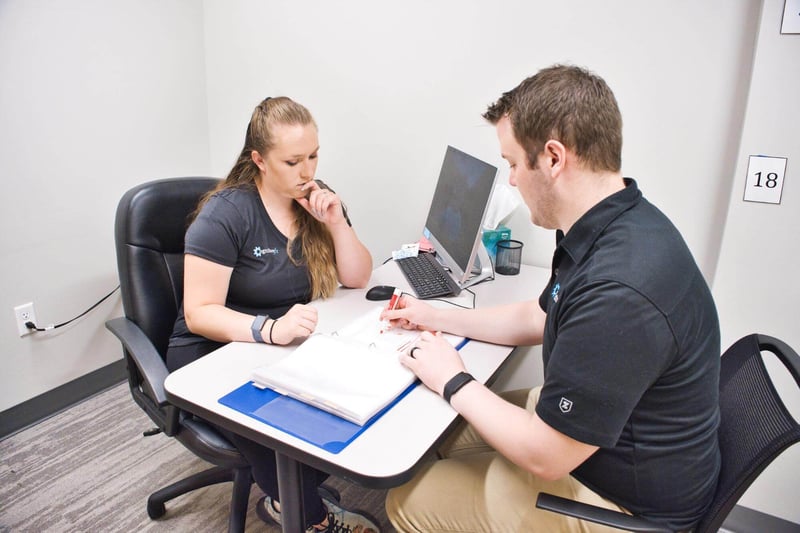
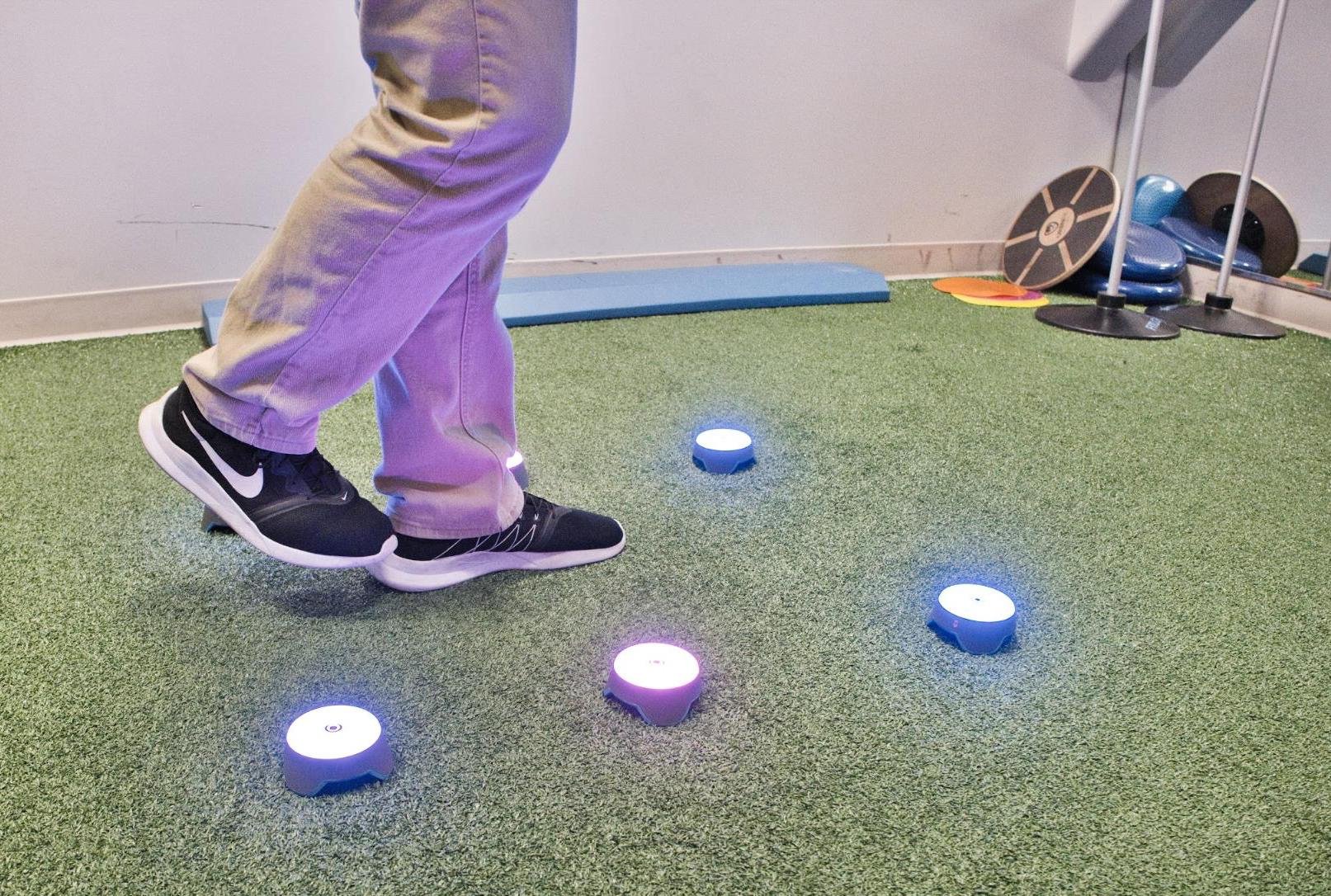
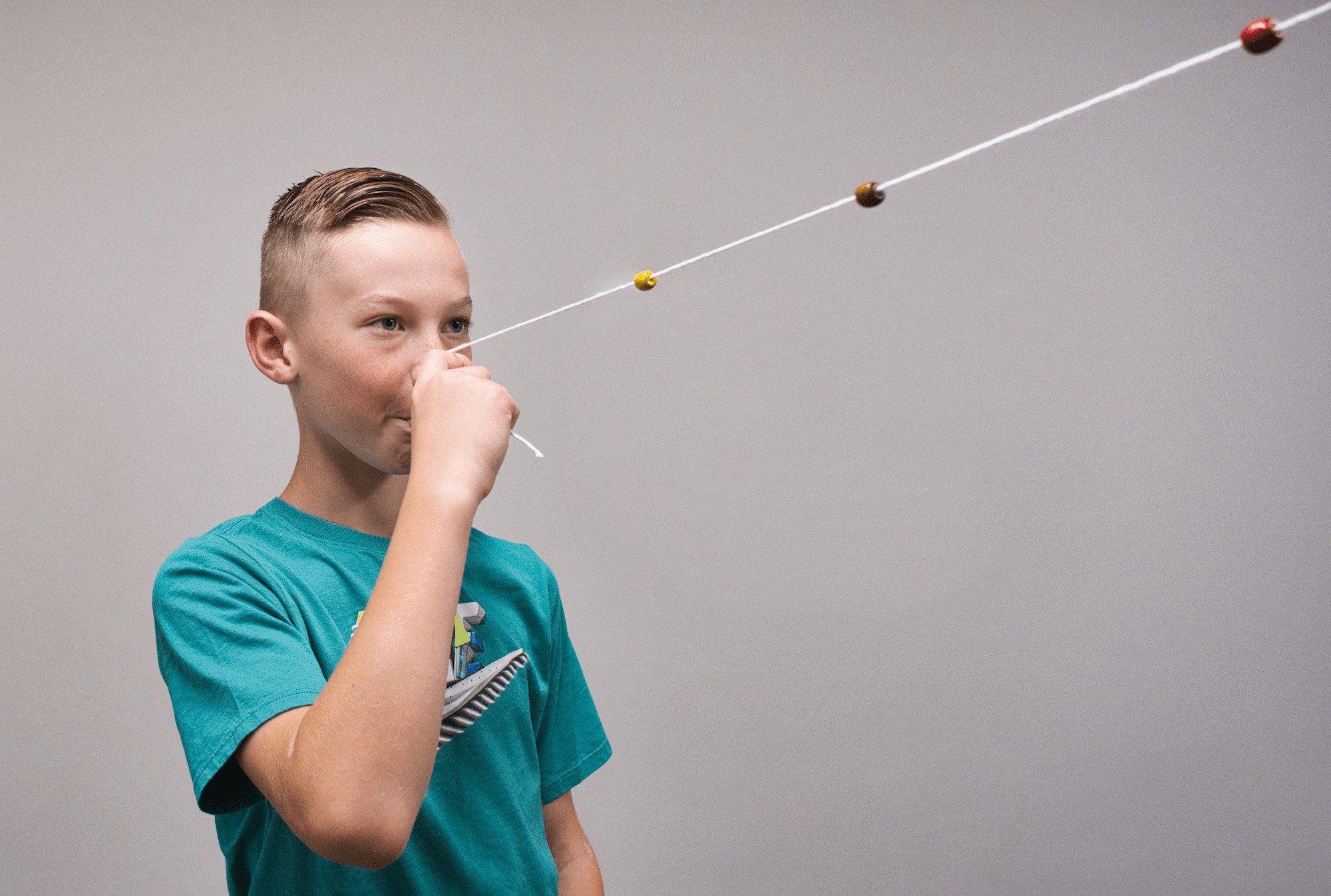
In most cases, patients at Cognitive FX receive the same types of therapy, but the specific exercises and how they’re combined vary considerably from patient to patient. That’s because the experience is tailored to each person’s injury and scan results.
As a result, our treatment produces consistent and reliable results. Most patients don’t recover 100% by the end of our treatment program (called Enhanced Performance in Cognition (EPIC)), but they experience significant improvements in many symptoms and continue to improve at home. Over 90% of our patients have verifiable symptom improvements by the end of their first week of treatment, and the average symptom improvement is over 60%. We collect data on symptom improvement and constantly improve our treatment program based on the latest research.
Finally, patients also enjoy periods of rest throughout the day. These periods may include breathing exercises and listening to brainwaves to promote relaxation, neuromuscular massage of the neck and shoulders, and mindfulness exercises.
At the end of treatment, patients undergo a second fNCI scan to assess how their brain responded to treatment. Patients also meet with one of our therapists to discuss their results and how to continue recovery at home. Unlike Amen Clinics, we don’t offer medication, but we may refer patients to additional specialists if they need further treatment, such as neurologists, psychologists, and therapists.
90% of our patients report reduced symptoms after their treatment at Cognitive FX. To see if you’re a good fit for our program, sign up for a consultation.
Amen Clinics
Cognitive FX
.png?width=552&height=204&name=amen-clinics-vs-cfx%20(6).png)
About 2 to 4 weeks after treatment, patients have a follow-up appointment, which can be done in person, over the phone, or via video conference. At this appointment, patients and doctors discuss progress at home and establish a plan to continue further with recovery.
Patient support after their treatment is also very important for us. Patients receive a set of exercises to do at home, including aerobic exercises, cognitive games, and relaxation techniques. We recommend patients spend about an hour every day, five days a week, doing these exercises, either alone or with loved ones. When they feel better, they can gradually reduce the time spent doing these exercises.
Patients who experience a relapse due to re-injury or who have other questions as they progress are always welcome to contact our team for advice. We also have an exclusive patient support group on Facebook for those who go through our treatment program.
Amen Clinics
Cognitive FX

Treatment for PCS is expensive. What patients need to assess is what they’re getting for their money.
Treatment starts at $5,300 for two SPECT scans. Based on the results, their team will then suggest a variety of treatments (as described above), which are typically offered on a monthly subscription basis. This greatly increases the total cost of the treatment.
In our opinion, these clinics are expensive. Most patients looking for post-concussion syndrome treatment already know they have PCS, so the SPECT scan is of limited use. Most PCS patients at Amen Clinics are offered psychiatric sessions accompanied by medication and dietary supplements. These appointments may be helpful, but there is no evidence to suggest they are a complete treatment for PCS. Plus, these treatments can be acquired elsewhere for a fraction of the cost charged by Amen Clinics.
We are not an in-network provider with any insurance plans. We do provide CPT codes (see the full list on our pricing page), and some of our patients obtain partial reimbursement when filing with their insurance companies.
Our treatment is still costly, but we do our best to price it fairly for the value provided. We offer four pricing packages.
fNCI Only: $3,500
For those who are unsure of how they’d like to proceed, the fNCI offers in-depth data on your specific brain injury. This package includes a post-scan review with a member of our treatment team who can explain the results and recommend the next steps. If you decide to pursue treatment at our clinic, the $3,500 paid for the scan is credited to the cost of treatment. (For example, if you chose the one-week plan, your remainder would be $9,500 instead of $13,000.)
fNCI + At-home Action Plan: $4,500
This plan is especially competitive compared to Amen Clinic’s offering. It includes the fNCI and post-scan meeting with our team, plus an action plan that you can bring to your local therapist. It includes information about the most important areas in which your brain needs to improve and exercises we recommend specifically for you. You’ll also receive a prioritized list of games from Brain HQ that you can do by yourself at home.
This price includes a three-month follow-up with the Cognitive FX team to discuss your progress. If you want additional care with the Cognitive FX team, the cost of the $4,500 is credited toward your treatment plan. (For example, the one-week plan would then cost $8,500.)
One-Week Treatment Plan: $13,000
Our one-week long treatment plan includes…
Two-Week Treatment Plan
This is the treatment plan with the best measured outcomes for our patients. It includes everything from the one-week treatment plan but gives your brain and body more time to adapt based on treatment. In addition, you’ll receive an evaluation by a medical doctor for hormone testing.
If you’re unsure which plan to choose, our team would be happy to discuss options with you.
Amen Clinics
Cognitive FX
Although both Amen Clinics and Cognitive FX offer treatment for PCS patients, our approaches are very different.
Amen Clinics list over 40 conditions they claim they can treat with a team composed mainly of psychiatrists and naturopaths. In contrast, we specialize in treating only the persistent effects of brain injury (whether from concussion or similar causes). We tackle them with a dedicated team of specialists including neurosurgeons, neuropsychologists, neuroscientists, many types of therapists, and more.
Amen Clinics use a type of brain imaging scan called SPECT. Although it can detect brain damage caused by the concussion, this scan is not detailed enough to identify what specific areas of the brain were affected and how. In contrast, at Cognitive FX, we use a scan called fNCI. This scan produces real-time images of what’s happening in the patient’s brain, which means our therapists can identify exactly where and how the brain is struggling. This information is crucial for us to design a personalized treatment plan for each patient.
Amen Clinics offer a variety of treatments for PCS patients. However, some of these, such as HBOT and neurofeedback, have very little scientific backing and others, such as nutraceuticals and medication, involve expensive monthly subscriptions. At Cognitive FX, we offer a combination of exercise and multidisciplinary therapies to address the root problems caused by the concussion. Everything we do is backed by scientific studies.
Ultimately, we think the $4,500 fNCI scan + at-home treatment plan is a significantly improved value over the cost of treatment at Amen Clinics. Plus, we measure patient outcomes and consistently see strong results from our in-clinic treatment program.
On average, our patients’ symptoms improve by 60% after just one week of treatment. To see if you are eligible for treatment, sign up for a consultation.

Dr. Mark D. Allen holds a Ph.D. in Cognitive Science from Johns Hopkins University and received post-doctoral training in Cognitive Neuroscience and Functional Neuroimaging at the University of Washington. As a co-founder of Cognitive Fx, he played a pivotal role in establishing the unique and exceptional treatment approach. Dr. Allen is renowned for his pioneering work in adapting fMRI for clinical use. His contributions encompass neuroimaging biomarkers development for post-concussion diagnosis and innovative research into the pathophysiology of chronic post-concussion symptoms. He's conducted over 10,000 individualized fMRI patient assessments and crafted a high-intensity interval training program for neuronal and cerebrovascular recovery. Dr. Allen has also co-engineered a machine learning-based neuroanatomical discovery tool and advanced fMRI analysis techniques, ensuring more reliable analysis for concussion patients.
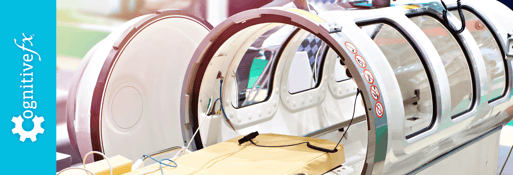
Oxygen is good for the brain. A lack of oxygen is bad for the brain. So is getting more than normal levels of oxygen better for the brain?

After suffering a mild traumatic brain injury, you might expect to feel off for a few days before being able to function at your normal level again. However, a rapid return to normal is not the case...

Post-concussion syndrome is downright frustrating to experience. Doctors often miss it during diagnosis, and even if they do make the diagnosis, treatment methods vary considerably from clinic to...

From a small outpatient clinic in the 1920s, Cleveland Clinic has grown to become one of the world’s largest integrated medical systems. With over 65,000 providers worldwide, Cleveland Clinic has...
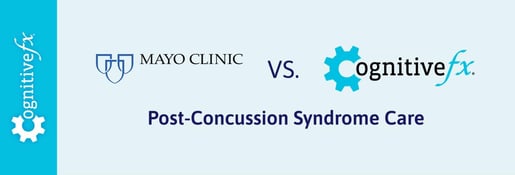
If you have post-concussion syndrome, you might think that the Mayo Clinic would be a serious contender as your treatment provider. After all, the Mayo Clinic is a world-renowned medical and research...
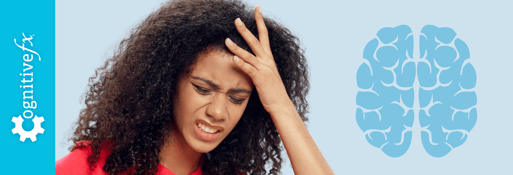
The type of head injury doctor you need to see depends on the type of injury you’ve experienced and how long ago the injury occurred. Doctors who excel at concussion treatment, for example, are often...
Published peer-reviewed research shows that Cognitive FX treatment leads to meaningful symptom reduction in post-concussion symptoms for 77% of study participants. Cognitive FX is the only PCS clinic with third-party validated treatment outcomes.
READ FULL STUDY